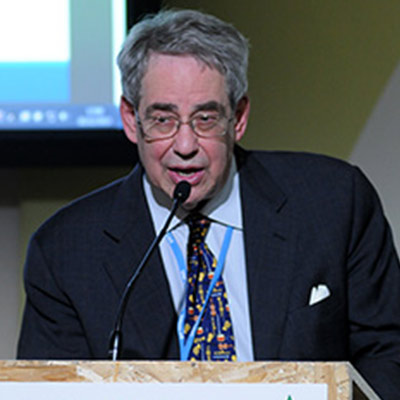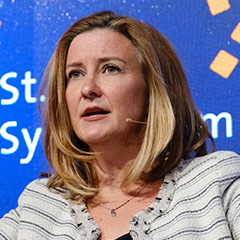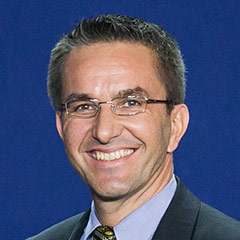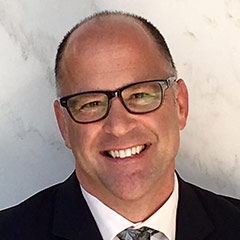Social Innovation at the Gabelli School of Business

Around the world, expectations are rising.
Young people are demanding that governments and businesses act now to slow the warming of the planet. The wealth inequality gap is becoming impossible to ignore. Consumers want to patronize businesses that make products of value and contribute to society. CEOs worldwide are calling to redefine the purpose of a corporation.
There is a pressing need to inspire and equip future leaders with the values and vision to help business move society forward. This is what the Gabelli School of Business offers uniquely to the world.
Why the Gabelli School of Business?
While social innovation—applying creative, practical, sustainable, business approaches to solve social and environmental problems, especially to benefit vulnerable or marginalized populations—is a relatively new focus for many corporations and business schools, it has been a special focus of intellectual investment at the Gabelli School for many years.
This values-driven head start at Fordham has afforded us the opportunity to build a comprehensive platform to incubate social innovation. This infrastructure features a group of experts who hold the title of Gabelli Fellows. It includes a global network of social entrepreneurs and business innovators that connects almost every key actor in the sector. It encompasses courses for undergraduate and graduate students, and it houses a Social Innovation Collaboratory where passionate individuals can workshop and execute their ideas while benefitting from the wisdom of their peers, expertise of faculty and local business advisors.
The Gabelli School has built the strong foundation required to converge cutting edge research and professional practice that will allow companies, social sector organizations, and nations to rise to the level of the world’s expectations.
Social Innovation is for Everyone
We at the Gabelli School are, first and foremost, global educators. We seek to develop the mindsets and capabilities in the next generation of business leaders who instinctively wake up every morning wondering how they can do better for those around them.
Some of our students do this by becoming social entrepreneurs: people who start new businesses that are grounded in the mission of advancing society. Social entrepreneurs develop products and services that meet market demand, but they do so in ways that bring about broad positive outcomes and address pressing social issues.
We recognize, however, that many young people will get involved with business in ways outside entrepreneurship. So, in addition to supporting our socially-minded entrepreneurs, we teach social innovation and intrapreneurship: the idea that any business in any sector can be infused with values-driven impact – embodying the principles and mastering the tools and approaches that yield benefits for all.

Our Network Model
What we are talking about here is large-scale, systems-level change—something that no business, government, or organization can accomplish alone.
The Gabelli School leads in social innovation by linking three groups that play a crucial role in answering today’s global challenges: academics, who conduct research that serves as a cornerstone for social awareness, meaningful discussion, and deliberate action; practitioners, the businesses and government leaders who put socially innovative methods into action; and students, whose energy and new ideas are defining the direction of social innovation sooner and faster than many realize.
Our Partners
The Gabelli School’s network includes institutions and thought leaders who are on the forefront of meeting ever-increasing societal expectations for socially beneficial business:
The Gabelli School is one of 38 universities worldwide chosen by the UN as a champion and model of responsible management education (PRME) based on ethics and social values.
Fordham is one of 45 universities designated as a “Changemaker Campus” by AshokaU, an organization that sets the global standard for social innovation education.
The Gabelli School is an academic collaborator with SASB in the emerging field of sustainability accounting. Together, the two institutions sponsor education, research, and public events.
In a program organized by Stanford, University Innovation Fellows advocate for lasting institutional change and create opportunities for students at their home schools—including Fordham—to engage with innovation, entrepreneurship, design thinking, and creativity.
This global apparel giant placing social responsibility at the heart of its corporate mission, selected the Gabelli School as an academic partner in building knowledge about, implementing, and evaluating socially innovative approaches.
The Gabelli School is the exclusive academic home to the American Innovation Index, developed by NHH and implemented by Rockbridge Associates. A national barometer of customer perceived innovativeness and social innovativeness in the United States; the index covers nearly 200 brands in more than 20 industries across 40,000 customer touchpoints.
Educational Programs: On-campus and Online
Gabelli School’s mission embodies “business with purpose,” an overarching concept where social innovation finds a natural home. Students encounter this core value in every course, in every degree program, and at every level. It plays out in an especially central way in the programs below. Follow the links to learn more.
- Undergraduate first-year core curriculum
- Undergraduate concentrations: Social Innovation, Sustainable Business
- Undergraduate honors program: Ignite Scholars
- MBA concentration: Global Sustainability
- MS in Management
Fordham students, faculty, alumni, and community members who feel a resonance with social innovation and social entrepreneurship can follow their passion at:
Research: The Next Frontier
Gabelli School scholars conduct pioneering research that helps us “see around the corner” in social innovation, even before many practitioners arrive at those crossroads. Research informs successful, transformative social innovation policy and practice. Our current research initiatives include:
- Gabelli Fellows: These accomplished experts and social innovators chose the Gabelli School as their platform to make a difference in the world. In addition to their scholarship, they add to our global network and increase the visibility of social innovation. Current fellows include Katherine Milligan, Patrick Struebi, and Jan Dash, PhD.

To help ensure a livable world, Jan promotes climate change risk management. He is the editor of the Climate Change Encyclopedia (2021, World Scientific), and the founder of Climate CARO, motivating universities to train MS students for a new business profession – climate change risk and opportunity officer. Jan is lead climate advisor to the NGO Committee on Sustainable Development-NY, and also did the math behind the Bloomberg Climate Clock that won a 2016 NY Press Club Award. He is editor of the Climate Portal, a collection of extensive information on climate change and global warming. Jan also spoke on a panel at the 2015 Paris Climate Conference.
Jan was a leader in quantitative finance and risk management. As a director, he managed PhD quant/risk groups at Bloomberg LP, Citigroup, and other leading firms. He was visiting research scholar at Fordham University’s Gabelli School of Business and adjunct professor at the Courant Institute (NYU). His book, Quantitative Finance and Risk Management, A Physicist’s Approach, was originally published in 2004.
In his previous career as a physicist, Jan was directeur de recherche at the Centre de Physique Théorique (CNRS, Marseille, France). He published over 60 scientific papers.

Katherine Milligan is a strategic advisor, coach, board member, and mentor to individuals and institutions working to achieve greater social impact. She is a Gabelli Fellow at Fordham University where she teaches the Global Immersion Course on Social Innovation & Social Entrepreneurship. She also teaches master's courses on social entrepreneurship at the Graduate Institute of International Affairs and in the MBA program at the University of Geneva in Switzerland.
From 2012 - 2018, she was the Executive Director of the Schwab Foundation for Social Entrepreneurship, the sister organization of the World Economic Forum, which supports the largest community of late-stage social entrepreneurs in the world. Milligan is the author of over 17 publications, articles, and blogs published by International Institute of Economics, Stanford Social Innovation Review, MIT journal Innovations, World Economic Forum Agenda, and the Harvard Business School.
She received her B.A. from Dartmouth College, and her Master’s in Public Policy from Harvard University where she was the recipient of the Pforzheimer Scholarship for Excellence in Non-Profit Management.

Patrick Struebi is a social entrepreneur, thought leader, and founder and CEO of the Fairtrasa Group, a pioneering social enterprise that lifts marginalized small-scale farmers out of poverty. Fairtrasa is one of the largest organic and fairtrade exporters from Latin America with a vertically integrated business structure, impacting over 40,000 direct beneficiaries. He is also the co-founder of Blooom, a cutting-edge AgTech platform with the goal of lifting one million farmers out of poverty by 2023.
For his work with Fairtrasa, Struebi was selected as an Ashoka Fellow, an Endeavor high-impact Entrepreneur, and a Yale World Fellow. Furthermore, he has been named four times Social Entrepreneur of the Year by the Schwab Foundation (2014), the ABC Foundation (2012), Univision (2012), and Visionaris (2009).
Struebi is also a Gabelli Fellow and teaches Social Innovation at the Gabelli School of Business. In 2014, the World Economic Forum named Struebi a New Champion, and he is also a member of the Clinton Global Initiative. He writes a column at HuffPost and gives talks around the world on social innovation and related issues.

Jerry White is a Nobel laureate and award-winning Gabelli Fellow at Fordham known for leading high-impact campaigns. Three of which led to major international treaties: the Landmine Ban Treaty, the U.N. Convention on the Rights of Persons with Disabilities; and the Cluster Munitions Ban. He shares in the 1997 Nobel Prize for Peace awarded to the International Campaign to Ban Landmines. White served as U.S. Deputy Assistant Secretary of State.
A Senior Ashoka Fellow, White served as U.S. Deputy Assistant Secretary of State to launch the Bureau of Conflict and Stabilization Operations. He is President of JW Impact Strategies, LCC, and a Professor of Practice in Religion and Political Science at the University of Virginia.
- Faculty Research Fellows: These fellows receive funding for research in the area of corporate social responsibility.
- Visiting Scholars: Inspired by the philosophy that success in social innovation will require worldwide collaboration, this program brings scholars from outside Fordham together with our faculty and students to do work in the area of social innovation.
- Gabelli School - PVH Thought Leadership Grants: Renowned researchers in corporate social responsibility receive these grants, sponsored by PVH Corp., to raise awareness of their research findings at the annual Business and Sustainability Conference at Fordham.
For more information about our global leadership in social innovation at the Gabelli School, please contact us with any questions:
Lerzan Aksoy
Dean
Professor of Marketing
Fordham University
Gabelli School of Business
New York, NY 10023
Email: aksoy@fordham.edu
Tel: (718) 817-4157